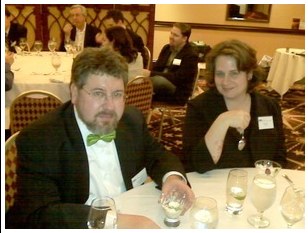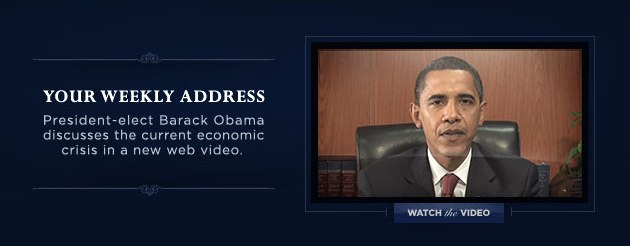Laura Fitton (@pistachio, Principal of Pistachio Consulting) accepted the SNCR Innovator of the Year Award on behalf of Twitter founders Jack Dorsey, Biz Stone, and Evan Williams.
Voice Mail Archives
Past editions of Voice Mail, Beth Dunn's newsletter on writing and voice.
Posts by BethDunn:
Society for New Communications Research Symposium

This weekend I had the distinct pleasure of assisting Jennifer McClure, the Executive Director of the Society for New Communications Research, at the Society's annual Symposium and Awards Gala.
Held this year at the Marlowe Hotel in Cambridge, Massachusetts, the Symposium was a day-long presentation of SNCR's research, conducted by SNCR Fellows and collaborators, which continues to yield some of the most useful data about and case studies on the emerging use of new media by brands, corporations, nonprofits, small businesses, and educational institutions.
The Awards Gala presented the 2008 Excellence in New Communications Awards, which consisted of over 50 citations, commendations, and awards for excellence to organizations and individuals that exemplified innovation in, as the SNCR website puts it,
the use of social media, ICT, mobile media, online communities and virtual worlds and collaborative technologies in the areas of business, media, and professional communications, including advertising, marketing, public relations and corporate communications, as well as entertainment, education, politics, and social initiatives. In addition, the SNCR Fellows honor their choices for the SNCR Visionary of the Year, Innovator of the Year and Brand of the Year.
This year, the recipients of the SNCR Visionary of the Year Award were Josh Bernoff and Charlene Li, co-authors of the book Groundswell: Winning in a World Transformed by Social Technologies. On hand to accept the award was Josh Bernoff, VP and Principal Analyst at Forrester Research.
Groundswell has had an enormous impact on my thinking about Web 2.0, and I have blogged about it extensively here. I've been using the methodology laid out in Groundswell in my presentations to nonprofits and cultural organizations on how to use social technologies to advance their mission and keep their bottom lines healthy and strong. If you haven't read it yet, I strongly recommend you do. I promise, you'll like it.
I took video of all the awardees, and will be posting more soon, but I wanted to share this one first. Congratulations to all the winners. It was a tremendous evening, and I was very glad to share it with you.
[viddler id=bb745c62&w=437&h=370]
[Flickr photos of the Symposium can be found here and here.]
[Twitter stream of the symposium can be found here. Shel Holtz live-blogged it here.]
Government 2.0

The announcement came a day or so ago: President-Elect Obama will be recording a brief, weekly video address, and distributing it via YouTube. For the legions of social media practitioners who participated in his campaign, and for those who watched from the sidelines or from another campaign's trenches, this constitutes big news.
It's being hailed as a first important step in fulfilling the promise of his campaign, not in the sense of advancing any particular agenda or legislation, but in the sense of moving forward with the remarkable community base his campaign built up over the past two years.
Many of us have been wondering how President-Elect Obama would use the channels of communication so painstakingly established and so effectively used during his presidential campaign to help steer his team through the transition process, and onward into the full term of his presidency.
Some predicted that this election would usher in an era of "Government 2.0" and establish an unprecedented level of transparency and authenticity in government and governing. Some remained more cynical. I doubt that any of us expected the Obama team to abruptly relinquish the powerful tools of social media once they crossed the finish line of the election.
So far, what I have seen is a certain amount of pulling back on the Obama team's part. During the campaign there was a visible give-and-take between the campaign's foot soldiers and the top leadership team, and the MyBarackObama.com website allowed for real participation and user contribution, through blogs, messaging, and events that brought the online world into Real Life (like the coordination of neighborhood rallies and events).
Now, however, the new Change.gov website is considerably more one-way. The only blog on the site is the one from the Obama transition team, and comments are not enabled. There's a place for visitors to "Share Your Story" and "Share Your Vision," but this, too, is a one-way conversation.
I had an interesting conversation this weekend with Josh Bernoff, co-author of Groundswell, about the Obama team's shift in tone on their social media. He also blogged recently about the new Change.org website, and points out a few things worth repeating:
Is it social? Not yet. It contains outgoing information. And it solicits your feedback. But when you tell President-Elect Obama your vision for America, your suggestion goes . . . well, I don't know where it goes. You type it in and then get the "thanks for sharing" message shown here. Will they just pick the ones they like and republish them?
Embracing applications like mystarbucksidea.com require two things to be successful. 1. everyone needs to see all the ideas. And 2. the organization has to respond -- tell what it is going to do (or not do) about the ideas.
He then issues a call to action, and asks readers to go to the change.gov website and ask them to change they way they run this part of the site:
So here's what you should do. Publish all the ideas that people enter on this site. Allow us all to vote for them. And then tell us, directly, what you are going to do to address the ones that are most popular, or the best.
Interestingly, about 4 days after Josh issued this call to action, a new entry on the Change.gov blog published a smattering of submitted entries. Maybe four or fine snippets are quoted here among the tens (hundreds? thousands?) of thousands of entries they must have already received. Just as Bernoff predicted, they just picked the ones they liked and republished them.
It reads less like a message board and more like a stump speech.
It's too bad, because the real, authentic sharing of the voices of actual people was what made that campaign go. It now looks like they're imposing a far more finely-meshed filter on the social media content on their site. This has the unfortunate effect of putting the brakes on the momentum, and stifling the part of what they were doing that really engaged with individuals, with communities.
Let's hope the filter comes off again as time goes on.
artists break rules
I'm on my way up to Boston in a little while to lead a workshop on Getting the Word Out for artists at a conference organized by my friend Kathy Bitetti, executive director of the Artists Foundation. I'm pretty excited about it -- it's my favorite thing to do, work one-on-one with artists and arts organizations who are feeling their way around social media, trying to build relationships, broaden audiences, and generally raise their visibility.
on election eve
In a surprise move to none, I have been excruciatingly busy these last few weeks, my first semester as an MBA student. I have just recently managed to jump clear of my first round of exams, and now that all those midterms are behind me I am feeling considerably more grounded. There's really nothing like getting graded to let you know how you're doing.
re-imagining museums

Museums are changing.
That is, the smart ones are.
Museums are getting involved in social media, just as many corporations and brands are: some of them brilliantly, some less so, as we all stumble up the learning curve and discover that online communities are not just another place for an "e-blast," an impersonal press release, or an automated newsfeed.
So yes, museums are using the tools of the internet to reach audiences old and new, to build their brands, to raise awareness of their programs, collections, and exhibitions. For a look at how museums are using microblogging tools like Twitter, take a look at Beth Kanter's recent interview of Amy Fox, otherwise known as @museumtweets.
But a few of them are taking that extra step, and playing around with the implications of social media -- exploring community-driven content, collective intelligence, crowd-sourcing, and more -- and integrating it into what they do and why they do it.
Take a look at what Nina Simon is doing over at Museum 2.0.
And don't miss Seb Chan's work at Fresh + New(er) in Sydney, Australia.
And be sure to notice what Jake Barton is doing over at Local Projects. You'll recognize some of his projects, and, if you're at all like me, wonder with barely concealed impatience and excitement as to what he'll do next. Wildly creative projects.
I'm starting to frame some research around this phenomenon, as part of my MBA program at the Simmons School of Management in Boston, so I'll have quite a bit more to say on the subject over the months to come.
In the meantime, if you're in the Boston area, and want to help get my research started, why not join me for an hour's conversation about museums and Web 2.0?
I'm running two informal focus groups this coming Thursday and Saturday. Details are below. What do you think about museums, technology, community? What can a museum be? What should it be?
Thursday, October 23
6:30 - 7:30 pm
Room W-205
Main College Building
Simmons College
300 Fenway
Boston MA
Saturday, October 25
1:00 - 2:00 pm
Room W-205
Main College Building
Simmons College
300 Fenway
Boston MA
winning over executives to social media marketing

Chelpixie at Vibemetrix just linked on Twitter to a great post about how to talk to your CEO about "21st Century Marketing."
(She's been linking to some great articles and resources lately, even more so than usual. If you don't follow her on Twitter, and you like this sort of thing, consider giving her a follow.)
There's some very insightful stuff here, but what really got my attention was this last bit:
Extra tip: I have found that having executives read the book "The New Rules of Marketing and PR" can be helpful. Sometimes CEOs just need an established author to tell them something, rather than an employee.
This is something that resonates strongly with me, and with many of my friends that I have spoken with over the last few years. We have all had similar struggles to win over our respective nonprofit senior executives and boards to using the tools of the new marketing as part of an organization's communications strategy.
It's a common lament: I proposed we (insert social media initiative here) months ago, and got shot down. Now I hear that they read a book/read an article/heard from an executive-level peer about (insert identical social media initiative here) and now they wonder why we aren't doing that.
It's frustrating.
It can be hard to be heard when you're an employee, especially when you are an employee recommending something new and untested (from their point of view).
That's why it's so important to arm yourself with as much quantifiable data as possible -- to be able to speak the language of business, understand how they expect to see things planned, measured, tracked, and reflected in the bottom line.
And, once you have gathered all this information and presented it in the most persuasive, compelling way you possibly can, accept the fact that people need to hear things like this from an authoritative source. A source that they consider to be authoritative. And that isn't necessarily you.
So arm yourself with a bibliography of articles from the newspapers and magazines they read, if you can. Find out what kinds of books they read, and see if you can find a slim volume to recommend like the one above.
But when choosing your references, remember that the credibility of the authors is in the eye of the beholder. Choose authors with credentials that your target (the person you are trying to convince) will find compelling and authoritative. Know your audience. Do they prize Ivy League credentials? Journalistic chops? Forbes 500 leadership experience? Best-seller status?
And don't forget the power of peer recommendation. Is a similar organization doing something like what you're proposing? Is your executive friends with their executive? Find out who they have lunch with, whose opinion they value, and maybe plant a seed or two ("Why don't you ask so-and-so about how their blog is coming?").
If they hear about it from somebody they trust, it only increases your own validity, and strengthens your argument.
Tailor your chosen authoritative source to the needs of the audience. And understand that it probably isn't you.
No offense.
What authoritative sources have you found to be helpful in winning over executives and decision makers?
(ed. Here's a list of new marketing books from Mitch Joel's blog, Six Pixels of Separation, from a few months back. What are your picks?)
the inquirer

Chris Brogan posted today on the importance of building relationships with folks online before asking any favors of them, and it sort of pinged on some things I've been thinking about, too.
Here's Chris's post, The Distance of Your Ask.
His use of the word "ask" refers in his post, of course, to the favors we sometimes ask of each other, and especially the favors that we are hoping to obtain from people we know of online and WANT to meet, those whom we set out to have a relationship with, usually with some sort of self-serving end in mind.
You know, "networking."
Sure, a lot of times I just want to meet someone so I can tell them I think they're awesome, and that someone out there likes and admires their work. It can be really hard to know that sometimes, and I know I always appreciate it when someone says similar things to me.
But sometimes I want to meet someone because I want to collaborate on them with a future project, and I hope they remember me and invite me, or will think to refer someone to me or my blog when a subject I write about comes up.
And sometimes I am approached by PR people, who want me to build awareness of their product. Sometimes they try to build a relationship first, sometimes they don't. Mostly they don't.
So what's the way to build that vaunted "relationship" with someone, to create lines of reciprocity and trust?
Ask.
I don't mean ask in the sense that ask means "request," but askin the sense that ask means "inquire."
Yes, we all need to have a nice, short, pithy little elevator speech, just so we can locate ourselves helpfullly on the internal mind map of whomever we are speaking to. But then we really need to stop with the declarative sentences that begin with "I" and start with the inquisitive sentences that start with those six little words journalists love so well:
- Who
- What
- Where
- When
- Why
- How
Who was that you were just talking to? What are you working on now? Where did you eat lunch? When is your next product/book launch? Why are you wearing that button? How did you get to interview that guy last month? Because that was great!
You get the idea.
I think we spend a lot of time worrying about what we are going to say about ourselves, what we should write in our press releases, what words will have more POP in our elevator speeches, when we might be better served by cooling it a little on ourselves and asking other folks about themselves.
If you're like me, and a little nervous of making conversation with people you've just met (and especially those you have admired from afar), this method has the added bonus of making your end of the conversation much, much easier.
It's this meaning of the word "ask" that I try to have emblazoned on the inside of my forehead when I'm in challenging social situations (read: all of them); this meaning of the word "ask" that I'd like to scrawl in black in on the palm of my hand when I get around new people.
So you might find that helpful too: Ask, before you Make An Ask.
a day in the life of an MBA student
OK, I'll admit that it's a little odd to commute every day from Cape Cod to Boston to get an MBA. But it is far from unheard of. Most people in Boston have no idea how many people commute every day from Cape Cod to Boston, five days a week, and do it without fail, for decades.
announcement

Some of you, not a lot of you, but some of you know already that I've gone back to school full-time. I'm now fully immersed in getting an MBA from the Simmons School of Management in Boston, and yes, that means I am commuting by bus, about an hour each way, from my home on Cape Cod.
I'm working as a graduate research assistant with one of the faculty at Simmons, Dr. Jill Avery, on some seriously engrossing research about branding, consumer-brand relationships, and web 2.0. I'm also doing some projects on looking at effective new media marketing of cultural organizations, especially museums.
So the work I'm doing now is very much a logical extension of what I've been doing here on Small Dots, and I'm not going to stop doing it here, but I thought you'd like to know the direction I'm going in with my focus and my thinking, and the tools of analysis I'm getting down and dirty with these days.
If you're like me and always wished there was more quantifiable stuff behind all this web 2.0 nonsense, more verifiable research, and more research we could be doing in the first place, then you'll probably enjoy what I'll be doing for the next little while.
Of course, the MBA program is pretty intensive, so my posting schedule is bound to change somewhat, as in fact it already has. But I'm spending my days in a very exciting and energizing place these days, swapping ideas with some very interesting and clever people, and I'll be bringing some of that home to you.
If you're in Boston, and want to meet up for coffee, now that I'm there every day, drop me a line. If you're interested to see what happens next, as I am, stick around.
It's going to be an interesting ride.
.png?width=500&height=500&name=bd%20(3).png)